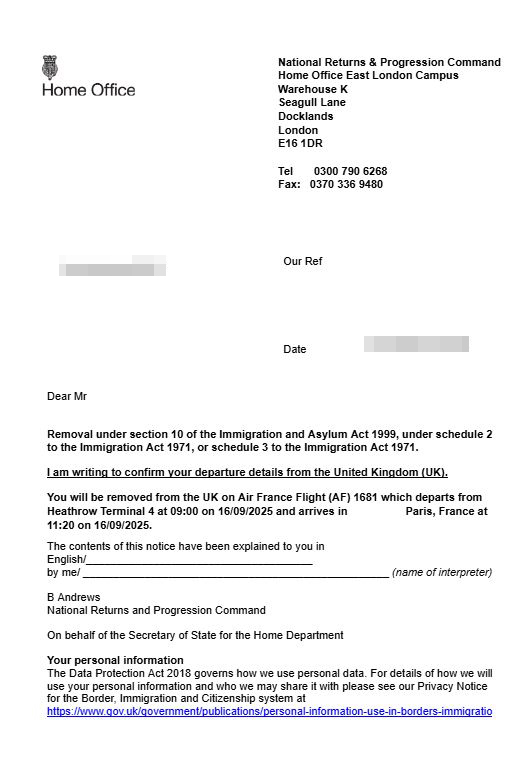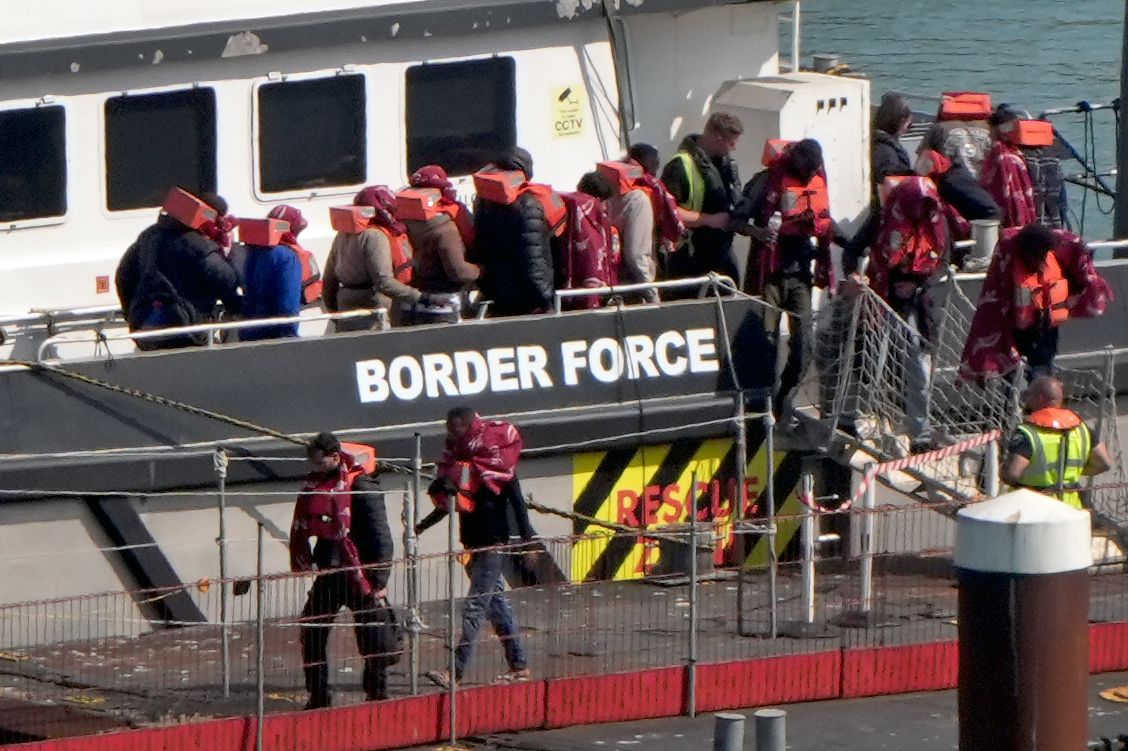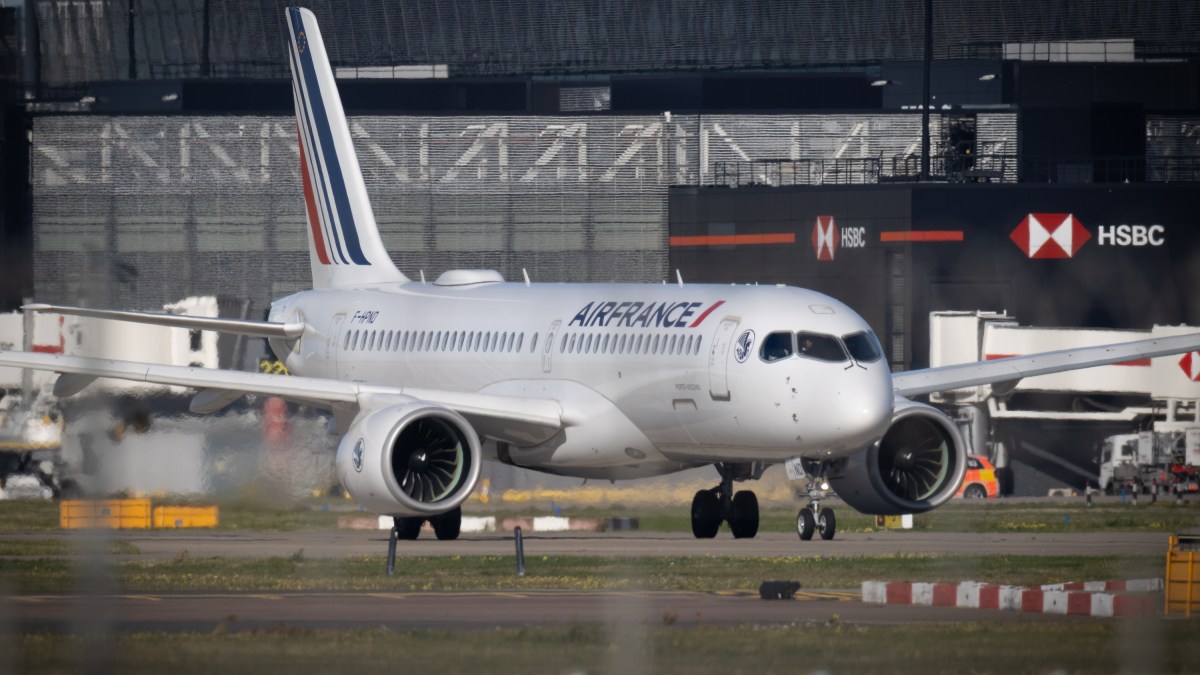The Home Office has failed to deport migrants to France for a second day in a row as outstanding human rights claims delayed their removal.
Lawyers acting on behalf of several migrants due to be among the first to be removed under the one-in, one-out returns deal revealed that their removal had been delayed after submitting last-minute legal challenges.
A flight leaving Heathrow for Charles De Gaulle airport in Paris was due to have a small number of migrants on board accompanied by escorts from the private contractor Mitie Care & Custody.
On board the flight, a Times reporter saw empty seats thought to have been reserved for deportations and the Home Office later confirmed that there would not be any deportations on Tuesday.
It is the second day in a row that the Home Office has failed to deport migrants on flights for which they had booked seats to get the returns deal under way.
It has booked a small number of seats on Air France passenger flights from Heathrow to Paris each day this week for migrant deportations and is still hoping to remove the first migrants by the end of week.
A letter sent to one of the migrants due to be onboard Tuesday’s flight, published exclusively by The Times, states: “You will be removed from the UK on Air France Flight (AF) 1681 which departs from Heathrow Terminal 4 at 09:00 on 16/09/2025 and arrives in Paris, France at 11:20 on 16/09/2025.”
The letter was sent from a Home Office unit named the national returns and progression command on behalf of the home secretary.

A claim submitted by one of the migrants who was due to be removed on one of the flights argued that their experience of being tortured and trafficked should prevent them from being returned to France.
Their deportation has been deferred while the Home Office considers its response. It is likely that the Home Office will refuse the claim but it is understood that officials have asked for more time to consider the case.
Legal sources said that similar human rights claims have delayed the removal of several other migrants who were due to be deported to France this week.
• Home Office uses digital ads to deter would-be migrants in France
France has said that it will accept only “a few individuals” this week under the deal and warned it could terminate the treaty at any moment.
Ministers insisted on Tuesday that the deportations would go ahead, but declined to give a “running commentary” on the details.
The justice minister Alex Davies-Jones told Times Radio: “These deportations will be happening as soon as possible.”
But she added: “If I was to break down with you exactly a time-by-time, day-by-day movement on our returns policy, then that would be giving these abhorrent people smugglers exactly what they want.
“This would be allowing them to know what the government is doing when, and they would be able to respond to that. We are not going to be doing them any favours.”
The Home Office fears that disclosing any operational details or expected numbers could compromise the smooth running of the first flights, which are crucial for the fate of the future scheme amid warnings from the French interior ministry that it could pull the plug if it believes it is not functioning well.
The ministry said that it would only accept a handful of migrants this week as it stressed the “very experimental nature of this deal”.
An interior ministry source told the AFP news agency: “We may terminate the agreement if we do not find it satisfactory.”
It is understood that only a maximum of about five migrants will be deported on each flight because each individual requires a couple of security escorts to prevent them from absconding or causing trouble. Bookings were also limited due to the uncertainty caused by the potential for last-minute legal challenges and other administrative obstacles.
It means that the number set to be returned this week is unlikely to be more than a few dozen. This is only a small proportion of the 5,590 migrants who have arrived on small boats since the deal came into effect.
So far this year a record 31,026 migrants have arrived on small boats, a figure that is 38 per cent higher than this time last year and 6 per cent more than the previous record-breaking year of 2022.

Some 5,590 migrants have arrived on small boats since the deal came into effect
GARETH FULLER/PA
The French interior ministry confirmed that the first asylum seekers to be transferred to Britain under the reciprocal agreement would be flown to London on Saturday.
Migrants removed to France under the deal will be taken from Charles de Gaulle airport in Paris to one of the 3,000 state accommodation centres used to house asylum seekers across different regions.
They are mainly run by charities with oversight and funding from the state. More than 100,000 asylum seekers are at present housed in these centres and the duration of stay ranges from a few days to up to a year. They are given food, basic healthcare, administrative and legal help and schooling for children.
Didier Leschi, director-general of the French immigration service, said that they will be encouraged to apply for “voluntary return” to their home countries.
Those who refuse to leave and are not qualified for asylum will be given orders to leave France. However, these “orders to quit French territory” have been widely criticised in France because only a small number are enforced, leaving people to stay illegally. Last year just 15 per cent of those ordered to leave actually left the country.
• How do the UK and France deal with Channel migrants?
The returns deal has been criticised by right-wing parties in France, who have dubbed it a “French surrender”. Refugee charities have also criticised the deal.
The deal has also been opposed by five Mediterranean countries, who have warned that it could leave them having to take back people deported from Britain to France under EU rules that would allow France to transfer them onward to the country where they first entered the bloc.
Nikolaos Anadiotis, a Greek MEP, wrote to the European Commission warning that it was “at odds with the principles” of the EU’s asylum system.
Shabana Mahmood, the home secretary, told MPs on Monday that further policies were being drawn up to deter migrants crossing the Channel.
She said: “I am clear that I will do whatever it takes, and I am already considering other measures that will deter people from crossing in the first place. I will update the House in due course.”

Shabana Mahmood, the home secretary
THOMAS KRYCH/ANADOLU /GETTY
Mahmood also reiterated her intention to seek international reform of the European Convention on Human Rights just days after Lord Hermer, the attorney-general, described pledges to reform the convention as “a political trick”.
Separately, the home secretary is drawing up proposals to change domestic legislation that will limit the power for judges to accept appeals against deportation or rejected asylum claims based on Article 8 of the ECHR, which protects the right to a family life.
